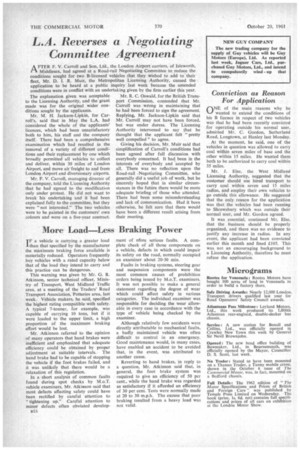L.A. Reverses a Negotiating Committee Agreement
Page 50

If you've noticed an error in this article please click here to report it so we can fix it.
AFTER F. V. Carroll and Son, Ltd., the London Airport carriers, of Isleworth, Middlesex, had agreed at a Road-rail Negotiating Committee to reduce the conditions sought for two B-licensed vehicles that they wished to add to their fleet, Mr. D. L R. Muir, the Metropolitan Licensing Authority, caused the application to be heard at a public inquiry last week because the amended conditions were in conflict with an undertaking given by the firm earlier this year.
The explanation given was acceptable to the Licensing Authority, and the grant made was for the original wider conditions sought by the applicants.
Mr. M. H. Jackson-Lipkin, for Carroll's. said that in May the L.A. had considered the whole of the applicants' licences, which had been unsatisfactory both to him, his staff and the company itself. There had been a comprehensive examination which had resulted in the removal of a variety of different conditions and their replacement by one which broadly permitted all vehicles to collect and deliver, within 30 miles of London Airport, and move air freight to and from London Airport and diversionary airports.
Mr. F. V. Carroll, managing director of the company, told the Licensing Authority that he had agreed to the modification only under protest. He did not want to break his undertaking and it had been explained fully to the committee, but they were "not interested." The two vehicles were to be painted in the customers' own colours and were on a five-year contract. Mr. R. C Oswald, for the British Transport Commission, contended that Mr. Carroll was wrong in maintaining that he had been forced to sign the agreement. Replying, Mr. Jackson-Lipkin said that Mr. Carroll may not have been forced, but was under duress. The Licensing Authority intervened to say that he thought that the applicant felt "pretty well compelled" to agree.
Giving his decision, Mr. Muir said that simplification of Carroll's conditions had been agreed after full discussion with everybody concerned. It had been in the interests of everybody and accepted by all. There was no reflection upon the Road-rail .Negotiating Committee, who generally did a useful job of work, but he sincerely hoped that in similar circumstances in the future there would be more adequate briefing of those who attended. There had been some misunderstanding and lack of communication. Had it been otherwise, he felt sure that there would have been a different result arising from their meeting.




































































































































